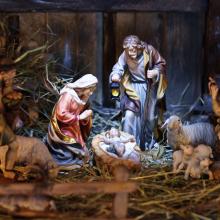Joseph
SEVERAL OF THIS month’s lectionary readings deal with the tensions of navigating wrongdoing, judgment, vengeance, and forgiveness. They call readers to forgive — and forgive again: not just once, twice, or seven times, but at least 77 times and counting (see Matthew 18:22).
These texts have been used throughout history to trap people in positions of disempowerment, abuse, and enslavement. Consider, for example, how victims of intimate partner violence have been pressured to forgive and return to their abusers, who then proceed to hurt them again. Or how entire marginalized communities are expected to “get over it,” whether that is the colonization of Turtle Island, enslavement, or generations of misogynist, queer- and transphobic policies, laws, and violence. In light of the rampant misuse of these texts, we’re right to be wary of biblical interpretations for how to handle conflict that reinforce domination. The texts tend not to deal directly with inherent interpersonal and structural power dynamics. We must do that work ourselves. Any of us preaching the lectionary this month must also be careful.
Attending to the power dynamics of these passages doesn’t mean we dismiss them as useless. Rather, such attention helps us discern how these texts invite and bear witness to God’s presence in processes of interpersonal, intergenerational, and even international healing. They call us to attend to what our own pain has to teach us and to seek hope through community life. And they promise that throughout our attending, God will abide — waiting patiently to see us through.
We thank you for thousands of sisters and brothers
Who seek education, who love this good land.
For they are a blessing to us and to others;
May we reach to offer a welcoming hand.

Image via Bruno Bollaert/Flickr
There are many ways you might spend International Women’s Day: going to work, staying at home, being a woman, or thanking a woman. This playlist is for all of these ways you’re observing the day, and more.
You probably don’t think of Christmas as a revolutionary holiday. Twinkling lights on trees, Starbucks gift cards, and sweet carols are not exactly the stuff of subversion. A domesticated Christmas is comforting, but considering our fraught political landscape today, we might find better lessons by reflecting on the disruption caused by Jesus’ birth, and the radical implications of his life.
Don’t expect a peaceful scene of Mary, Joseph, and baby Jesus when you open a Christmas card from Doctors of the World.
The British branch of the humanitarian group has opted to set the characters of the creche in the midst of Mideast crises. On one card, Mary and Joseph are leaning over the baby Jesus, as a missile traverses a starry night.
“Christmas is a time people contemplate the world,” the group said in its online introduction to the cards. “Doctors of the World’s cards seek to remind the public that this year war has forced millions from their homes, and they really need our help.”
When confronted with the uncomfortable presence of so many relegated to the social margins of our society, we tend to shrink inward lest the enormity of life’s injustices overwhelm us. When we hear of another shooting, we heighten our vigilance with our own kids. We do not allow them to take public transportation. We drop them off and pick them up with little time for them to wait aimlessly. We fill their days with activities we can monitor. We are overwhelmed. Sadly, we turn our backs on the child whose parents are absent or on the community conditions that allow the crime to continue. When we see a disheveled, animated person, we bristle, avert our eyes, rehearse our, “I don’t have any money to give you today” response, or redirect our path to avoid them altogether. We are overwhelmed by social displacement. We do not know how to fix what is wrong. We feel inadequate. We experience dis-ease. But what if our overwhelmed, seemingly insignificant, and certainly inconvenient act is the very thing that will preserve life?
As the Pharaoh’s second in command in charge of administering the empire’s grain silos during the famine, Joseph preserved life long before his brothers appeared before him. As the dream-interpreting, forward-planning Vizier of Egypt, Joseph had already saved the lives of many—the entire Egyptian community and all those who travelled there seeking relief from the famine in the land.
Though his act of providing for his family seems magnanimous and extreme, as the Pharaoh’s senior administrator, Joseph had the weight of the entire empire at his command. Relocating his family from impoverished Canaan to resource-rich Egypt was an important thing, but it was a small thing. Sometimes a relatively small thing preserves life. Sometimes preserving life is the change in your pocket, the attentive eye contact that assures another that you see and value their humanity, or the willingness to help another find the help they need. Preserving life may mean giving more than the change in your pocket, changing laws that devalue the humanity of others or leveraging your privilege to connect those who need care with care-givers. All to preserve the life of many.
Before I knew God, I knew Joseph.
If you grew up in the 80s, like I did, there’s a decent chance that your earliest knowledge of Joseph’s story came through a local high school or community theater production of Joseph and the Amazing Technicolor Dreamcoat. That musical (by Broadway legends Andrew Lloyd Webber and Tim Rice) playfully (and rather faithfully) tells the story of a young boy, the favorite son of the patriarch Jacob, who sets in motion both a family and a geo-political drama by flaunting his fashionable coat. As a youngest child, I loved the story—I fancied myself as the favorite son, destined for greatness, who would one day be like Jacob, irresistible to the ladies. There is a time in life when each of us is made up of ego needs and delusions of grandeur.
Last December, I decided to run after dark and entertain myself by running through neighborhoods, looking at lighted Christmas decorations as I passed by. It was a novel twist on my regular exercise, and I enjoyed gazing at the beautiful, the creative, and the tacky alike.
Then, I started noticing the insides of houses, too. The Christmas trees were lit and decorated; the insides of the houses seemed warm and inviting. Suddenly, instead of an independent adult on a crisp winter jog, I felt more like a homeless orphan from a George MacDonald Christmas story looking in at something I did not have and of which I could not be a part. Needless to say, the run lost its sense of adventure.
Recently, it has struck me how strange the situation was, both in what I saw Christmas to be and in my decision that I “didn’t have it.”
With just a few days to go before Christmas, many Americans will be rushing around completing their Christmas preparations: doing their last minute shopping, finalizing travel plans, figuring out how to deal with awkward family dynamics. In many cases, they will be faced with what is popularly known as #firstworldproblems — problems of inconvenience of a privileged and affluent people: delayed flights, out-of-stock gift items, spotty cell phone coverage.
At the same time, many people, hidden amidst the consumer celebration that Christmas has become, will be struggling just to find their next meal, shelter, community, and hope.
Striking census bureau statistics released earlier this year paint a picture of an expanding American underclass, with 15% of Americans living at or below the poverty-line, 23% of children (the highest percentage of poor by age) living in poverty, and the evaporation of the American middle class.
On the one hand, at this time of year, our society is more aware of the poor. Holiday food collections, toy and clothing drives abound, as does the ubiquitous ringing of Salvation Army bells. And yet, in many ways the plight of the poor is more hidden by the bright lights and rush of the season.
Whenever I hear someone lament that kids these days need to read their Bibles, I tell them that the Bible should be rated R for violence, nudity, rape, drug deals, and even genocide – and that’s just in the first book! Of course, as a youth pastor, I’ve found that the best way to get kids interested in the Bible is to tell them that if someone made it into a movie, it would be rated R.
The Bible and movies tell stories. Gareth points out the importance of stories in his article “It’s the Movies’ Fault/It’s not the Movies’ Fault” in which he brilliantly states that, “we could benefit from recognizing that the relationship between storytelling and the formation of human identity is crucial.” Indeed, the stories we tell are crucial to the formation of human identity, but the Bible and movies tell stories that are permeated with violence. So, the question becomes, how do we make sense of those violent stories in terms of human identity?

The Holy Family by Margret Hofheinz-Döring via http://bit.ly/rK5376
I noticed this Christmas season, for the first time, that not only were Mary and Joseph forced to migrate under Rome’s census; not only was the Incarnate God born into a humiliating space — but, as they fled to Egypt, they never registered in Bethlehem with the census. A dream, an angel, told the migrant father to gather his family and run from the authorities. Unaccounted for in the empire, baby Jesus’ first movement in this world was a government-evading trek through the desert by night.
I think about this as, right now, my friend Estuardo is probably crouching in the dark somewhere in the desert along the Mexican border. At the same time my wife and I hang electric Christmas lights on our tree, get out our nativity sets, and read familiar illustrated books about the stars in the sky above the shepherds. Estuardo has told me, from previous voyages across the border by night, how clear the stars are when hiding from the border patrol lights.
The One Percent. Dear Fork. Budget Cuts. Here's a little round up of links from around the Web you may have missed this week:
- "Of the 1%, by the 1%, for the 1%" -- Joseph Stiglitz on inequality in America.
- Dear Fork, You have a son.
- Go inside Prague's off-limits baroque library.
- We're not broke. Not even close.
- Our new and improved Daily Digest from Duane Shank is the best round up of relevant news articles out there. Yeah, I said it: It's the BEST.
- Let's thank our members of Congress for joining the hunger fast for a moral budget. (Call your member and ask them to join.)
- Stay updated on the latest news from the hunger fast for a moral budget.
- Michael Gerson on the real-world effects of budget cuts.
- Watch this CNN report on the hunger fast for a moral budget.
At church on a recent Sunday we were encouraged to find ways to see the world differently this week. Change our routine and change our perspective to help us get out of the rut of going through life without actually seeing the world. To that end we were asked to draw a slip of paper out of a basket on which was written some sort of paradigm destabilizer.






